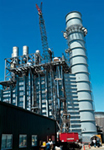Calpine CEO Peter Cartwright announced Jan. 16 that the San Jose, Calif.-based company will complete 27 gas-fired projects now under construction. It will continue to develop, but place on "hot standby," another 34 projects that will cut Calpine's construction investment this year by about $2 billion. The move will set back the company's goal of having 70,000 Mw of power on line by 2005. Instead, it will have just 26,300 Mw on line by mid-2003, with 15,100 Mw on hold until market forces are ripe for construction, says Ron Walter, Calpine senior vice president.
Calpine's announcement is the latest in a flurry of recent powerplant delays and cancellations by other power companies totaling about 82,000 Mw. Much of the market problems simply are a result of the forces of supply and demand. The weakening economy and warmer than normal temperatures have softened the demand for electricity, says Hugh Holman, a power industry analyst. "On the supply side, the financing spigot was closed. In the wake of the Enron collapse, rating agencies put fast-growing power companies on credit watch," says Holman.
 |
| ON ICE Firm will put 34 power projects on "hot standby." (Photo courtesy of Susan Lohwasser for ENR) |
Moody's downgraded the investment grade of Calpine's debt on Dec. 14 to junk-bond status. "The demand for capital by these power companies is astronomical. Now, lenders are nervous and support in the banking industry is faltering," says Holman. Even with the lower rating, Calpine raised $2.6 billion in the past month and $5 billion since October.
Companies like Enron and Calpine were considered leaders in the deregulated power market. Now, there is uncertainty as to how the market deregulation will proceed. "It's a mess," says Holman. Most analysts agree that Calpine is a victim of circumstances and will survive.
The powerplant delays and cancellations do not surprise many industry analysts. Cambridge Energy Research Associates, a think-tank in Massachusetts, considers 2002 to be the year of cancellations for new powerplants. "The megawatt tsunami is over. This is the beginning of a prolonged bust cycle,"says Chris Seiple, director of North American power for the group.
Seiple doesn't see a return to 2001's high demand for electricity until at least 2005. "In the meantime, there will be lots of new supply" from plants now under construction, he says. "It will be 2006 at the earliest before there will be new powerplant construction in the U.S." and strong investment won't come until 2008, he says.
However, Seiple notes that his prediction could unravel if the government adopts new four-pollutant environmental rules or supports the Kyoto Protocol on climate change. Either could force the retirement of old coal-fired powerplants and raise demand for gas-fired plants.
Other analysts agree that the predictions for huge numbers of new capacity by 2005 were bogus. "The cancellations and delays of natural-gas plants do not phase me. I never thought they would happen," says Chris Ellinghaus, principal at Williams Capital Group, New York City. He doubts Calpine will build beyond the 34 plants on "hot standby." Those will be built in 2006 or 2007, or possibly 2005, he says. Ellinghaus sees more coal-fired plants in the future as the natural gas market tightens. "The trend has already started and will really pick up in 2003," he says.
Calpine's delays will affect its engineering and construction providers. CH2M Hill Inc., Denver, already has revised its 2002 gross revenue targets down 20%, says Dan Arvizu, senior vice president for energy and industrial systems.
TIC Holdings Inc., Steamboat Springs, Colo., doesn't expect an impact on its revenue until 2003 or 2004. "We're meeting with Calpine later this month to roll out plans for 2002," says Brad Lawson, vice president for business development.
But all is not lost. "The fundamentals are still there," says John Redmon, executive vice president and COO of BE&K Inc., Birmingham, Ala. "There is still a need for power. It's just not all going to be built tomorrow."
alpine Corp., one of the nation's largest independent power producers, will delay construction of about $8 billion worth of projects, reflecting market forces that analysts are calling the "perfect storm" of the power industry.


